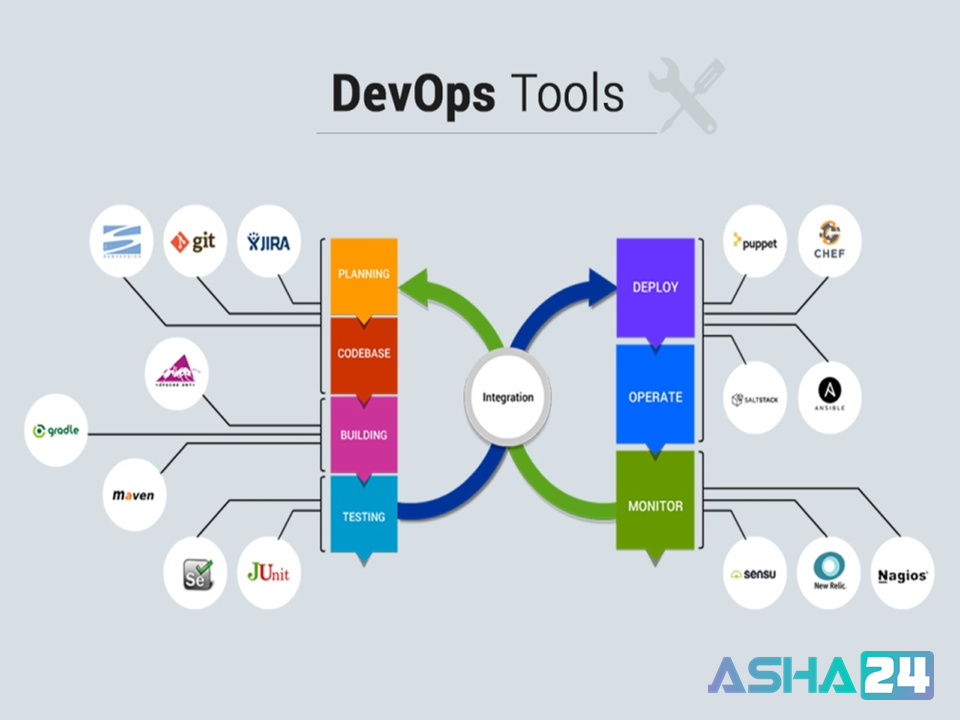List of DevOps Tools One Must Know – 2018
What are the DevOps tools offering in the cloud?
DevOps is a culture which encourages collaboration between Development and Operations to deploy key to faster production in an automatic and repeatable process. The word ‘DevOps’ gives us two processes; they are ‘development’ and ‘operations’.
DevOps is the combination of several tools that increase a company’s capability to deliver applications and services with great rapidity by producing products at a faster speed. This speed allows organizations to assist better towards their customers and play more efficiently in the market.
It presents more focus on continuous development, integration, and deployment, which serves various projects directly.
People attribute the increase of DevOps because it’s easy to modernize cloud-based applications and infrastructure continuously.
The primary aim of DevOps is to break down the opposed relationship and not only to work the two departments together, and also make them worked towards the same goals. The shared goals should be focused on producing a quality software product, instead of developers pushing for deployments and operations trying for stability.
What are the most using tools in DevOps??
There are so many tools that can assist with automation (Jenkins, Puppet, Chef, Salt, Docker, Juju, Appcore, and Ansible), implementation in cloud environments are more popular.

Jenkins:
The most popular continuous and delivery tools available are Jenkins. The source of Jenkins’ popularity on the market is a result of its open source, extensible, and distributed nature, as well as its utility that makes it useful for a variety of different projects.
Jenkins offers high-speed delivery of applications including continuous integration tool with java based. Jenkins is related to a version control system like GitHub. If the new code is shifted to a code container, Jenkins server will create and test that new code and notify the IT results.
The benefits of Jenkins are:
• It’s easy to start and moving in a variety of environments. We can also use other applications to get quickly started.
• This is especially useful for companies that need to build and continuously integrate various projects.
Ansible:
Ansible is one of the most leading tools of DevOps on the market today. The primary product currently offered by the Ansible team is Ansible Tower.
We can automate the apps and support quickly with Ansible configuration management and continuous delivery. Ansible is an agentless, effectual system for application deployment, configuration management, and instrumentation.
The benefits of Ansible are:
• We can manage the configuration of complex infrastructure environment with Ansible tools to save time and money.
• We can manage configuration from the central location and streamline application deployment with Ansible Tower.
• Easy to configure and manage our security and compliance policies with automated processes.
Puppet:
Puppet is the configuration management system that allows cloud engineers and IT professionals to define the state of their infrastructure and then automatically executes the correct position. Puppet automates the time-consuming manual tasks.
Puppet provides the tools to us who are necessary to enforce security procedures, effective security structures, and securely scale our foundation.
The benefits of Puppet are:
• It’s easy to automate uncomfortable tasks related to deployment and check for greater improvement speed.
• We can regulate the deployment and configuration processes with a domain-specific language.
Docker:
Docker creates isolated environments for applications also known containers. Certain containers are lightweight, cross-platform, and isolated for security.
Certain containers can be exported to any other server without making modifications to the application which is having dependencies, system libraries, and tools.
Docker has a vast developer community and it is achieving huge popularity among DevOps practitioners and engineers in cloud computing.
The benefits of Docker are:
• We can speed up the development process by moving from production to local environment with containers.
• Containers remove the hassles associated with testing in different environments.
Chef:
The value of the project is its ability to describe the infrastructure in a domain specific language and to configure, maintain it with code.
If we found problems which are having numerous servers and cloud-based resources to manage in a complex environment.
The benefits of Chef are:
• Chef is generally seen as a more effective and agile way to configure infrastructure
• A chef can save enormous amounts of time and money for large and small organizations.
Juju:
Juju is a cloud-based automation tool that allows developers to build cloud environments with commands. Its best practice can be utilized by DevOps practitioners to supervise configuration, maintenance, scalability, deployment, and management. Juju arranges services to support the deployment of centuries of configured services.
The benefits of Juju are:
• We can create our own appeal. It can be written in any language and may adjust existing scripts.
• It works great among Chef and Puppet for configuration and management.
Appcore:
Appcore is a complete cloud-based management tool that analyzes resource management, automated provisioning, and cloud-based configuration.
The benefits of Appcore are:
• It provides manageable user interface with an insightful view of the cloud
• It provides telemetry and event data for both virtual and physical devices
Git (GitHub):
Git refers to a container for storing versions of code, it is also known as a revision control system. It was uniquely designed and built by Linux kernel developers for Linux kernel development. GitHub is a plainly hosted code container that can be freely downloaded and distributed. Git is the most popular traditional source code management tool.
SaltStack:
We can arrange and automate CloudOps, IT Ops, and DevOps with high speed and scalability utilizing SaltStack. In systems and configuration management software, SaltStack is flexible to use and fast in open source option.
The SaltStack community is assigned to manage the Salt Open project focused, respectful and well.
The benefits of SaltStack are:
• Data filtering and development aggregation ensure efficient data management.
• Continuous code integration and deployment.
These are the few tools which we are using in DevOps.

Nitesh
Author
Bonjour. A curious dreamer enchanted by various languages, I write towards making technology seem fun here at Asha24.